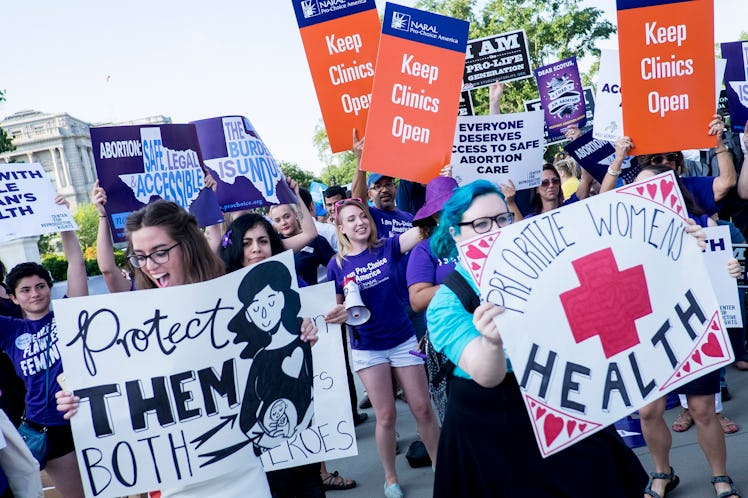
This Is Why You Need To Think Broader When It Comes To Abortion Rights
Forty-five years ago, the Supreme Court’s decision in Roe v. Wade, which declared abortion legal across the United States, was handed down. Rather than putting to rest the national debate over whether women should be able to make their own decisions about pregnancy, the Roe decision marked the beginning of a decades-long effort by some politicians to gut the legal right to abortion. Just three years after Roe, Representative Henry Hyde won passage for the Hyde Amendment — essentially denying poor women the very right Roe promised. (The Hyde Amendment bars the government from using federal funds through Medicaid for abortions except in the cases of rape, incest, and medical threats to the woman's life.)
Hyde was blunt: he wanted to ban abortion for all women. But he couldn’t, so he used his power to attack those who were already struggling to make ends meet. Trump and Hyde are cut from the same cloth. Now, 45 years after Roe, it’s important to understand that the Trump/Pence administration and our anti-abortion Congress are using the Hyde Amendment as their weapon of choice to stop women from getting abortions.
We see Hyde’s tentacles everywhere. We saw multiple attempts to insert Hyde-on-steroids language into Affordable Care Act (ACA, aka Obamacare) repeal legislation, including as recently as last month with the Obamacare Stability Funds. The Jane Doe case, wherein the Trump administration has attempted to block young immigrant women from getting abortions, was predicated on the Hyde Amendment — and yet used a novel new argument to attempt to expand its reach. During tax reform, Trump and Congress tried to expand the reach of Hyde by expanding funding restrictions. In 2015, Congress even almost derailed a bipartisan human trafficking prevention bill by adding in Hyde expansion language.
And while some people still question whether not having insurance coverage would stop anyone from pulling together the money for an abortion, the data speaks for itself. Restricting Medicaid coverage of abortion forces one in four poor women seeking an abortion to carry an unwanted pregnancy to term. It not only stops women from accessing abortion — it can push her deeper into poverty. A woman who wants to get an abortion but is denied is more likely to fall into poverty than one who can get an abortion.
Despite the daunting challenges of lifting Hyde, I am hopeful.
I am hopeful because last year, advocates in Illinois and Oregon passed new proactive bills to expand coverage for reproductive care including abortion. In fact, in 2017, 21 states adopted 58 new proactive measures to support and protect reproductive health and rights, a marked increase from the 28 enacted in 2016.
I am hopeful because we are finally having a conversation in this country — long overdue — about what it takes to build a society in which women are respected, and enjoy equal opportunities. We are talking about the exploitation of working women — not only the Hollywood elite but domestic workers, farm workers, service workers — women who struggle not only with sexual harassment and violence but who also struggle for a fair wage and decent working conditions. We are talking about the economic security, and the decisions families make in order to get from one paycheck to another. We are talking about the need to keep abortion legal, affordable, and available. Nationwide, keeping abortion legal has the highest levels of support in decades.
And these are, in fact, the same conversation. Fair wages, decent working conditions, and access to reproductive healthcare, including abortion, all help ensure that women and families can be healthy and economically secure. When we rise up for the Roe v. Wade anniversary this year, we rise up to keep abortion legal and lift the bans that push it out of reach, but we also rise up for a broader vision of what it means to live with dignity.
I’ll end by saying that this year, the Roe anniversary is personal for me. I’m pregnant and my due date coincides with the anniversary. Preparing to welcome and parent my second child only strengthens my resolve to create a bold future where all families can thrive, where all families can make their own decisions about pregnancy and parenting, and where all families can live and work with dignity and respect.
Destiny Lopez is the co-director of All* Above All. She gave birth to a healthy baby girl on Jan. 17.